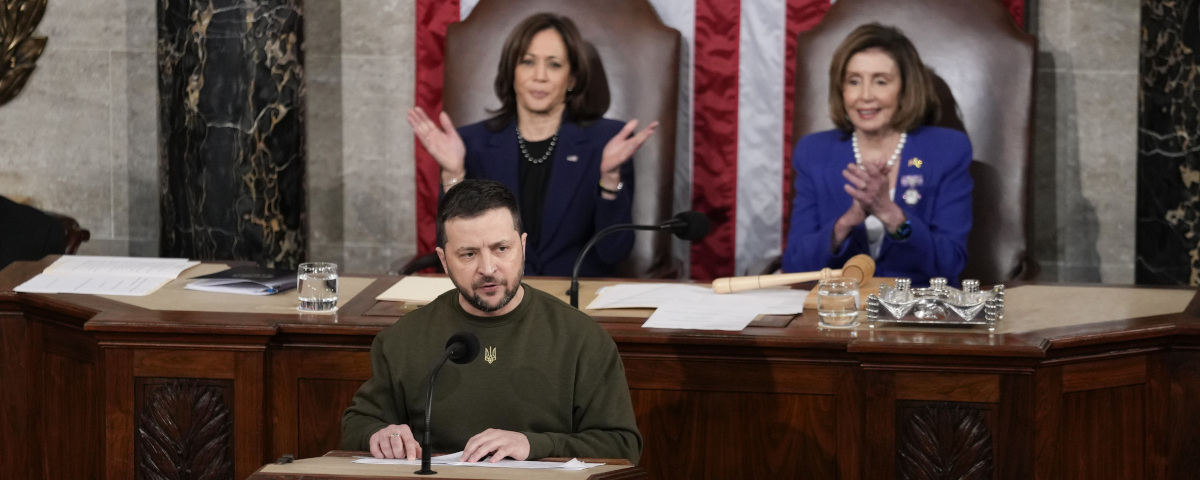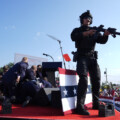To close out the year, we’ve asked our contributors and staff to make a prediction about 2023. You would think, after last year, that we’d have learned our lesson about making predictions, but we couldn’t resist. Feel free to save these if you want to embarrass us with them later.
Ukraine will become a wedge issue
By L. Graeme Smith
In 2023, Ukrainian President Volodymyr Zelenskyy will enter a new battlefield, one fought with memes and politics instead of missiles and people: the culture war.
Zelenskyy’s steadfast and genuinely courageous leadership in the face of unwarranted and seemingly overwhelming aggression from his Russian neighbour vaulted Zelenskyy into overnight status as liberalism’s most impressive living standard bearer. His resolve, clad in military green and positioned in the thick of conflict, was mythic in proportion (even if, like all myth, embellishment is part of the package) and captured the hearts and the imaginations of those in the free world horrified by totalitarian oppression and its insatiable appetite.
Ukraine’s refusal to back down, roll over, and die, its dogged defence of its own right to peaceful existence, put the lie in many ways to the narrative that the West was irredeemably weak, that it was destined to limp falteringly into decadence and irreversible decline. The people of Ukraine rallied behind their leader, with the support of the democratic world they fought and improbably continue to fight the invaders, and Zelenskyy became a hero.
And what do we do with heroes?
It should not be surprising that, dramatic though it will continue to be, the horrors of the Ukrainian war will not be able sustain the world’s attention and compassion compared to the all-consuming culture war, in all its fresh hell. And by us, I mean most prominently a polarized America, whose internecine squabbles shake and reverberate abroad to unsettle the rest of us in turn. Already, Zelenskyy and his struggle has increasingly become a wedge issue within American political discourse, merely another weapon at hand to criticize and cripple the other side. For whatever the merits of the Ukrainian mission, the worthiness of the cause, the justice that is being fought for, there will be a rising cohort—mostly from the Right, though not exclusively—consumed with cutting him down.
Not that there will not be ammunition. Prepare for unsavoury stories of corruption (and more), undoubtedly some true and some propagandized, to come ever more to the fore as Ukrainian pleas for support continue into a second year of long, bloody war and the rest of the world’s goodwill, patience, and interest in their cause begins to be exhausted.
Domestic political actors will take advantage for their own gain and attacks on Zelenskyy the myth will begin as fiercely as the attacks on Zelenskyy the man and Ukraine the country are being waged now.
The CAF will continue to teeter on the brink of collapse
By Richard Shimooka
2023 for the defence file in Canada will likely see the consequences of decisions made in 2022.
In the last year, the government has signalled significant shifts in Canadian defence policy—a renewal of Arctic capabilities announced in the summer, as well as a new Indo-Pacific strategy, both of which seek a much more robust role for the military in defending Canada and its interests. These strands will likely come together in the publication of a new defence policy update expected early in the year, but their tangible outcomes may emerge even sooner than expected.
It seems to be a newfound impetus to push through spending that will accelerate the renewal of the armed forces, and reinforce these shifts. That might include the acquisition of big-ticket capabilities such as the Boeing P-8 maritime patrol aircraft.
Unfortunately, these major policy moves will barely mask the reality of the CAF—an organization teetering on the brink of collapse. The after-effects of COVID, the sexual misconduct crisis, and attempts to reform military culture (among many other issues) all continue to affect the organization. It has contributed to dangerously low retention and recruitment rates that have affected its ability to generate units for deployment.
The Chief of the Defence Staff’s reconstitution order is the most tangible evidence of the military’s state, with the CAF essentially retrenching to a narrow set of core missions. Last week it was revealed that the RCAF would not provide a rotation of CF-18s to the NATO-enhanced air policing mission to Europe after doing so for nearly a decade. The reality is that this will likely be the last major overseas deployment for the next decade, as Canada has insufficient personnel and airframes to undertake anything but its core continental air defence mission. This story will be repeated across the military over the coming years.
Fixing the CAF will take a decade or more of intensive work, which includes limiting foreign deployments in order to not overstretch the military’s very limited capability. The question is whether the government will have the discipline to stick to this plan. Canada seemingly has been able to resist the pressure to deploy a force to stabilize Haiti, but other crises will almost certainly emerge. If Ottawa fails, then it may upset the delicate balance, and lead headlong into a total collapse.
Recommended for You

Ginny Roth: J.D. Vance, Pierre Poilievre, and how they slice their economic pie

David Polansky: As President Biden leaves the race, will the Democratic Party hodgepodge hold?

Peter Menzies: The mainstream media should love Doug Ford, now that he’s subsidizing them

Geoff Russ: A future Conservative government must fight the culture war, not stand idly by








